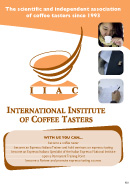Italian Espresso Abroad: A True Story In Taiwan
by Carlo Odello
Trainer and member of the board of the International Institute of Coffee Tasters
 When I arrive in Taipei on Saturday afternoon, the city welcomes me by light rain that is getting heavier. It often rains here in Taiwan. My interpreter Raffaele always jokes about this and tells me that the rainiest city in the country is the one he comes from, which is even worse than Taipei!
When I arrive in Taipei on Saturday afternoon, the city welcomes me by light rain that is getting heavier. It often rains here in Taiwan. My interpreter Raffaele always jokes about this and tells me that the rainiest city in the country is the one he comes from, which is even worse than Taipei!
When I get to the hotel I’m told that unfortunately I’m too early to check-in. I have to wait: Taipei is like a small Japan and yet they speak Chinese here – however I don’t intend to upset the orderly balance of this island. Raffaele, who apart from the Italian name is one hundred percent Taiwanese, suggests that we go and visit a good friend who has just changed his job. I think it’s a good idea. Three subway stops and twenty minutes later we get there.
The place is new and manages to combine Asian refinement with that modern touch that one can find in similar coffee bars in the United States (everyone knows that the Americans are good at exporting their formats). However, this one is not part of a big chain and it serves up the espresso of a famous Italian brand.
My friend wants me to try the coffee and give her my opinion on it. To say no in Italy would be rude, so never mind in Asia, where good manners are everything. And then again I haven’t had a real coffee in over 24 hours (why do they always serve up that dark broth on the flight?).
After a short wait we are served a cup of coffee of a known Italian brand. The first sip confirms what I had observed from looking at it: it’s under-extracted. It’s watery and bitter in the mouth and the aroma barely reaches my nose. It is well known that this coffee is delicate even when fully extracted, so under-extraction destroys it. The problem is not the quality of the product; you can drink far worse in Italy, as I tell my friend. With her beautiful Asian smile she asks me what I really think of it. And I explain the problem using all the tact that I possess. I do so in technical terms because she is a taster of the International Institute of Coffee Tasters.
She nods in agreement: it is under-extracted and she explains why. Basically, the owner of the coffee bar does not allow anyone to adjust the grinding, as he is probably terrified of the possibility of wasting coffee. In a country where the least that you can expect is rain, getting up to typhoons during the summer, grinding coffee correctly becomes very important.
I think to myself that the issue is not the owner of the bar who imposes this strict diktat. The point is the Italian brand which should probably check up more on what goes on in the bars that serve up its coffee. Business is business, but not checking what customers are doing in a turbulent market such as the Taiwanese market means that you stoop to the mediocre quality offered by the American and Japanese chains that are popping up everywhere on the island.
The good news is that meanwhile it has stopped raining and I can take up the road towards the hotel. The under-extracted coffee has given me a coup de grace: I’m totally ready to enjoy the comfort of my room now.

